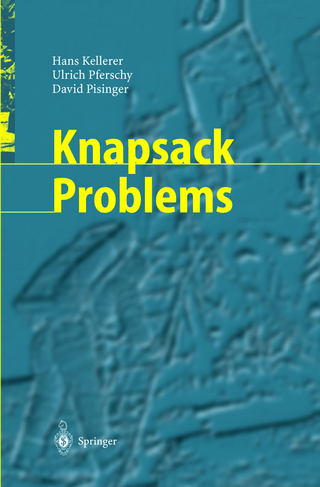
2015, ISBN: 9783540402862
[ED: Buch], [PU: Springer Berlin Heidelberg], Neuware - Thirteen years have passed since the seminal book on knapsack problems by Martello and Toth appeared. On this occasion a former col… Mehr…
| booklooker.de |

ISBN: 9783540402862
Thirteen years have passed since the seminal book on knapsack problems by Martello and Toth appeared. On this occasion a former colleague exclaimed back in 1990: "How can you write 250 pa… Mehr…
| Springer.com Nr. 978-3-540-40286-2. Versandkosten:Worldwide free shipping, , DE. (EUR 0.00) Details... |

2003, ISBN: 9783540402862
Springer, Gebundene Ausgabe, Auflage: 2004, 568 Seiten, Publiziert: 2003-12-15T00:00:01Z, Produktgruppe: Buch, Hersteller-Nr.: 105 black & white illustrations, 33 blac, 4.74 kg, Verkaufsr… Mehr…
| amazon.de MOLUNA Versandkosten:Gewöhnlich versandfertig in 3 bis 4 Wochen. Die angegebenen Versandkosten können von den tatsächlichen Kosten abweichen. (EUR 3.00) Details... |

2003, ISBN: 3540402861
2004 Gebundene Ausgabe Operations Research, Unternehmensforschung, Diskrete Mathematik, Optimierung, Mathematik für Informatiker, algorithms; combinatorialoptimization; computer; comput… Mehr…
| Achtung-Buecher.de MARZIES.de Buch- und Medienhandel, 14621 Schönwalde-Glien Versandkosten:Versandkostenfrei innerhalb der BRD. (EUR 0.00) Details... |

2003, ISBN: 9783540402862
Gebundene Ausgabe
Buch, Hardcover, 2004, [PU: Springer Berlin], [ED: 1], Springer Berlin, 2003
| lehmanns.de Versandkosten:Versand in 10-14 Tagen. (EUR 0.00) Details... |


2015, ISBN: 9783540402862
[ED: Buch], [PU: Springer Berlin Heidelberg], Neuware - Thirteen years have passed since the seminal book on knapsack problems by Martello and Toth appeared. On this occasion a former col… Mehr…
ISBN: 9783540402862
Thirteen years have passed since the seminal book on knapsack problems by Martello and Toth appeared. On this occasion a former colleague exclaimed back in 1990: "How can you write 250 pa… Mehr…

2003
ISBN: 9783540402862
Springer, Gebundene Ausgabe, Auflage: 2004, 568 Seiten, Publiziert: 2003-12-15T00:00:01Z, Produktgruppe: Buch, Hersteller-Nr.: 105 black & white illustrations, 33 blac, 4.74 kg, Verkaufsr… Mehr…
2003, ISBN: 3540402861
2004 Gebundene Ausgabe Operations Research, Unternehmensforschung, Diskrete Mathematik, Optimierung, Mathematik für Informatiker, algorithms; combinatorialoptimization; computer; comput… Mehr…

2003, ISBN: 9783540402862
Gebundene Ausgabe
Buch, Hardcover, 2004, [PU: Springer Berlin], [ED: 1], Springer Berlin, 2003
Bibliographische Daten des bestpassenden Buches
| Autor: | |
| Titel: | |
| ISBN-Nummer: |
Detailangaben zum Buch - Knapsack Problems
EAN (ISBN-13): 9783540402862
ISBN (ISBN-10): 3540402861
Gebundene Ausgabe
Taschenbuch
Erscheinungsjahr: 2004
Herausgeber: Springer Berlin
546 Seiten
Gewicht: 1,005 kg
Sprache: eng/Englisch
Buch in der Datenbank seit 2007-06-04T16:52:15+02:00 (Berlin)
Detailseite zuletzt geändert am 2023-10-28T19:58:30+02:00 (Berlin)
ISBN/EAN: 3540402861
ISBN - alternative Schreibweisen:
3-540-40286-1, 978-3-540-40286-2
Alternative Schreibweisen und verwandte Suchbegriffe:
Autor des Buches: pferschy, david, keller hans, ulrich keller, hans kellerer, hans will, hans bäck, martello
Titel des Buches: knapsack problems
Daten vom Verlag:
Autor/in: Hans Kellerer
Titel: Knapsack Problems
Verlag: Springer; Springer Berlin
548 Seiten
Erscheinungsjahr: 2003-12-15
Berlin; Heidelberg; DE
Sprache: Englisch
274,99 € (DE)
BB; Hardcover, Softcover / Mathematik/Sonstiges; Optimierung; Verstehen; Mathematik; algorithms; combinatorial optimization; computer; computer science; linear optimization; optimization; programming; Optimization; Operations Research and Decision Theory; Discrete Mathematics in Computer Science; Operations Research, Management Science; Unternehmensforschung; Management: Entscheidungstheorie; Mathematik für Informatiker; Diskrete Mathematik; EA; BC
1 Introduction.- 1.1 Introducing the Knapsack Problem.- 1.2 Variants and Extensions of the Knapsack Pr©blem.- 1.3 Single-Capacity Versus All-Capacities Problem.- 1.4 Assumptions on the Input Data.- 1.5 Performance of Algorithms.- 2. Basic Algorithmic Concepts.- 2.1 The Greedy Algorithm.- 2.2 Linear Programming Relaxation.- 2.3 Dynamic Programming.- 2.4 Branch-and-Bound.- 2.5 Approximation Algorithms.- 2.6 Approximation Schemes.- 3. Advanced Algorithmic Concepts.- 3.1 Finding the Split Item in Linear Time.- 3.2 Variable Reduction.- 3.3 Storage Reduction in Dynamic Programming.- 3.4 Dynamic Programming with Lists.- 3.5 Combining Dynamic Programming and Upper Bounds.- 3.6 Balancing.- 3.7 Word RAM Algorithms.- 3.8 Relaxations.- 3.9 Lagrangian Decomposition.- 3.10 The Knapsack Polytope.- 4. The Subset Sum Problem.- 4.1 Dynamic Programming.- 4.2 Branch-and-Bound.- 4.3 Core Algorithms.- 4.4 Computational Results: Exact Algorithms.- 4.5 Polynomial Time Approximation Schemes for Subset Sum.- 4.6 A Fully Polynomial Time Approximation Scheme for Subset Sum.- 4.7 Computational Results: FPTAS.- 5. Exact Solution of the Knapsack Problem.- 5.1 Branch-and-Bound.- 5.2 Primal Dynamic Programming Algorithms.- 5.3 Primal-Dual Dynamic Programming Algorithms.- 5.4 The Core Concept.- 5.5 Computational Experiments.- 6. Approximation Algorithms for the Knapsack Problem.- 6.1 Polynomial Time Approximation Schemes.- 6.2 Fully Polynomial Time Approximation Schemes.- 7. The Bounded Knapsack Problem.- 7.1 Introduction.- 7.2 Dynamic Programming.- 7.3 Branch-and-Bound.- 7.4 Approximation Algorithms.- 8. The Unbounded Knapsack Problem.- 8.1 Introduction.- 8.2 Periodicity and Dominance.- 8.3 Dynamic Programming.- 8.4 Branch-and-Bound.- 8.5 Approximation Algorithms.- 9 Multidimensional KnapsackProblems.- 9.1 Introduction.- 9.2 Relaxations and Reductions.- 9.3 Exact Algorithms.- 9.4 Approximation.- 9.5 Heuristic Algorithms.- 9.6 The Two-Dimensional Knapsack Problem.- 9.7 The Cardinality Constrained Knapsack Problem.- 9.8 The Multidimensional Multiple-Choice Knapsack Problem.- 10. Multiple Knapsack Problems.- 10.1 Introduction.- 10.2 Upper Bounds.- 10.3 Branch-and-Bound.- 10.4 Approximation Algorithms.- 10.5 Polynomial Time Approximation Schemes.- 10.6 Variants of the Multiple Knapsack Problem.- 11. The Multiple-Choice Knapsack Problem.- 11.1 Introduction.- 11.2 Dominance and Upper Bounds.- 11.3 Class Reduction.- 11.4 Branch-and-Bound.- 11.5 Dynamic Programming.- 11.6 Reduction of States.- 11.7 Hybrid Algorithms and Expanding Core Algorithms.- 11.8 Computational Experiments.- 11.9 Heuristics and Approximation Algorithms.- 11.10 Variants of the Multiple-Choice Knapsack Problem.- 12. The Quadratic Knapsack Problem.- 12.1 Introduction.- 12.2 Upper Bounds.- 12.3 Variable Reduction.- 12.4 Branch-and-Bound.- 12.5 The Algorithm by Caprara, Pisinger and Toth.- 12.6 Heuristics.- 12.7 Approximation Algorithms.- 12.8 Computational Experiments Exact Algorithms.- 12.9 Computational Experiments Upper Bounds.- 13. Other Knapsack Problems.- 13.1 Multiobjective Knapsack Problems.- 13.2 The Precedence Constraint Knapsack Problem (PCKP).- 13.3 Further Variants.- 14. Stochastic Aspects of Knapsack Problems.- 14.1 The Probabilistic Model.- 14.2 Structural Results.- 14.3 Algorithms with Expected Performance Guarantee.- 14.4 Expected Performance of Greedy-Type Algorithms.- 14.5 Algorithms with Expected Running Time.- 14.6 Results for the Subset Sum Problem.- 14.7 Results for the Multidimensional Knapsack Problem.- 14.8 The On-Line Knapsack Problem.- 15. Some Selected Applications.-15.1 Two-Dimensional Two-Stage Cutting Problems.- 15.2 Column Generation in Cutting Stock Problems.- 15.3 Separation of Cover Inequalities.- 15.4 Financial Decision Problems.- 15.5 Asset-Backed Securitization.- 15.6 Knapsack Cryptosystems.- 15.7 Combinatorial Auctions.- A. Introduction to NP-Completeness of Knapsack Problems.- A.1 Definitions.- A.2 NP-Completeness of the Subset Sum Problem.- A.3 NP-Completeness of the Knapsack Problem.- A.4 NP-Completeness of Other Knapsack Problems.- References.- Author Index.Weitere, andere Bücher, die diesem Buch sehr ähnlich sein könnten:
Neuestes ähnliches Buch:
9783540247777 Knapsack Problems (E. Zeitler)
< zum Archiv...



